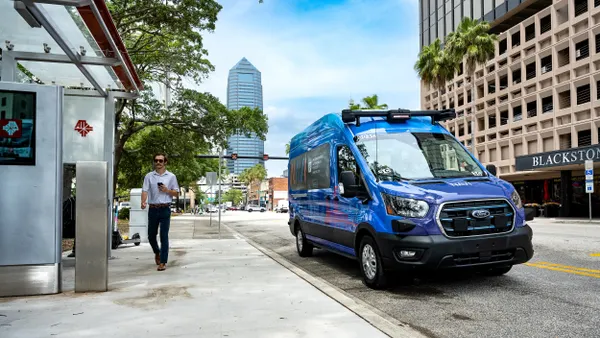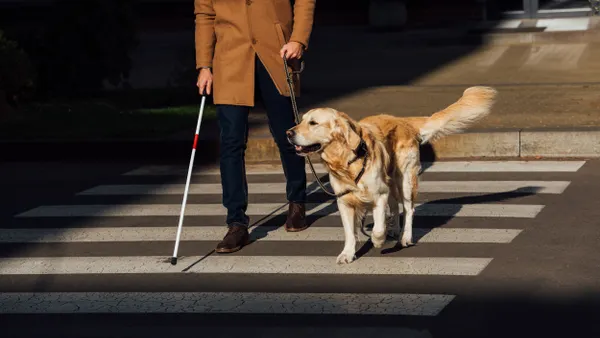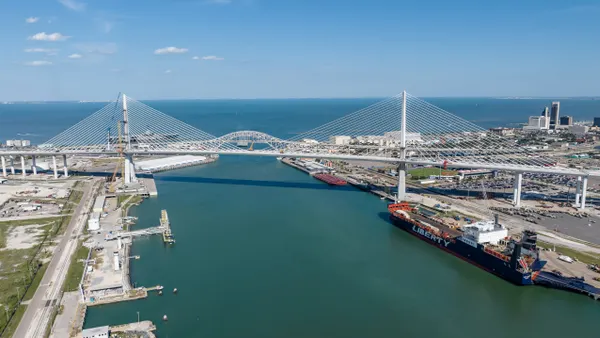UPDATED, Feb. 28, 2020: The Transit Innovation Partnership and MTA have selected nine startup companies for its 2020 Transit Tech Lab accelerator program. The startups include:
| Company | Solution |
| Acoustic Protocol | Converts audio public address announcements into targeted messages |
| NaviLens | Uses an algorithm to provide navigation guidance without a need for wireless coverage |
| Okeenea | Provides transit system navigation for riders who are visually impaired or hard of hearing |
| Knaq | Provides innovative elevator and escalator maintenance tools |
| Allvision IO | Inventories curb infrastructure and monitors street parking behavior |
| CARMERA | Provides real-time construction data and descriptions |
| CurbFlow | Sources curb supply data from cities to enable curbside management and maps |
| Numina | Measures curb-level behaviors using camera-based sensor |
| Miles | Provides anonymized multimodal analytics and rewards to encourage public transit use |
The companies were selected out of a pool of more than 130 applicants. Each of the startups will work with a mix of partner organizations including NJ Transit, the Port Authority of New York and New Jersey and the New York City Department of Transportation.
Dive Brief:
- The Transit Innovation Partnership, a public-private initiative between the New York Metropolitan Transportation Authority (MTA) and the Partnership for New York City, announced today the second round of its Transit Tech Lab accelerator program.
- The 2020 Transit Tech Lab will seek private sector technology solutions to three main challenges facing New York transit: accessibility, traffic coordination and revenue generation. Entrepreneurs and growth-stage companies are encouraged to apply for the accelerator, which will give select companies the opportunity to formally pilot their solutions with the MTA or a participating transit agency.
- The Port Authority of New York and New Jersey, New York City Department of Transportation, New York City Taxi and Limousine Commission, NJ Transit and Amtrak have joined as partners of the 2020 Transit Tech Lab.
Dive Insight:
This announcement follows the completion of the inaugural Transit Tech Lab accelerator, which graduated six companies that developed solutions to address the city's subway and bus challenges. Four of those companies — Axon Vibe, Veovo, Remix and Preteckt — were selected in July to pilot their innovations with the MTA.
Rachel Haot, executive director of the Transit Innovation Partnership, told Smart Cities Dive it's been "a very busy 10 weeks" since the end of the first accelerator program, however the lessons learned from that program are helping to shape the second round into an even more rewarding experience.
"The importance of having strong partners was really clear" during the first program, Haot said, which resulted in the new additions of NJ Transit, Amtrak and other agencies. "In New York City, in order to have a successful urban pilot for certain technologies, that's only possible if you have additional partners working with you ... Often there's overlapping jurisdiction and a lot of these agencies are interconnected."
These partners also helped influence the selection of the three challenges for the 2020 lab.
Haot said the challenge of accessibility was a consideration when developing the first accelerator program, and that challenge has become even more of a priority, especially as reflected by MTA's new Capital Improvement Plan which commits $5.2 billion to making subway stations more accessible.
Traffic coordination was selected as a challenge because it "reflects different trends both in mobility and public transit," such as the growth of for-hire vehicles, the increase of e-commerce deliveries and the addition of more bike lanes in the city. "With more partners, we could tackle this problem even more aggressively ... If we are able to support greater [traffic] coordination, we can essentially support a more efficient city."
The third challenge of entrepreneurial revenue generation was selected to lessen the dependence of toll fares and taxes in the city. "This was met with open arms from a number of different agencies ... We see an opportunity to not only learn from existing systems that are leveraging their assets to produce entrepreneurial revenue, but also learn from the private sector and to potentially be a leader," Haot said.
The Transit Tech Lab saw about 100 applications during the first round, which "really exceeded our expectations," said Haot. She hopes even more people will be interested in applying for the accelerator in the second round.











